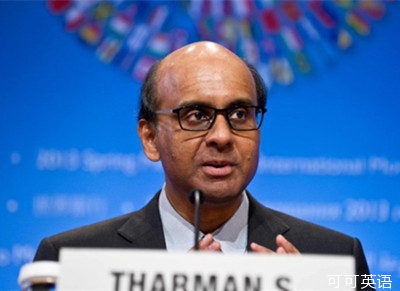Communiqué of the Twenty-Eighth Meeting of the International Monetary and Financial Committee, Chaired by Mr. Tharman Shanmugaratnam, Deputy Prime Minister of Singapore and Minister for Finance
國際貨幣與金融委員會第二十八次會議公報
會議由新加坡副總理兼財政部長尚達曼主持
October 12, 2013
2013年10月12日
The global recovery is continuing. Growth remains subdued, however, and downside risks persist, with some new risks emerging. There are encouraging signs of improving activity in advanced economies, while growth in many emerging market economies has moderated. Growth has generally remained resilient in low-income countries. We will build on recent progress and implement more ambitious and coherent policies for strong, sustainable, and balanced growth, while reducing market volatility. This requires carefully managing multiple transitions, including a shift in growth dynamics, normalizing global financial conditions, achieving fiscal sustainability, a rebalancing of global demand, and moving to a more stable global financial system. Structural policies to boost productivity, reduce unemployment and to achieve more inclusive growth are warranted in many countries. We welcome the directions set forth in the Managing Director’s Global Policy Agenda.
全球經(jīng)濟在繼續(xù)復(fù)蘇。然而,增長依然疲軟,下行風(fēng)險持續(xù)存在,新的風(fēng)險在出現(xiàn)。先進經(jīng)濟體的活動出現(xiàn)了可喜的改善跡象,但許多新興市場經(jīng)濟體的增長有所減緩。低收入國家的增長普遍保持了抗沖擊力。我們需要在近期所取得的進展的基礎(chǔ)上,實施力度更大的、連貫一致的政策,以實現(xiàn)強勁、可持續(xù)、均衡的增長,同時努力緩解市場波動。為此,必須謹慎地管理多個轉(zhuǎn)變過程,包括增長動態(tài)的變化、全球金融條件的正常化、財政可持續(xù)性的努力實現(xiàn)、全球需求的再平衡調(diào)整,以及向更穩(wěn)定的全球金融體系的不斷邁進。許多國家應(yīng)實施結(jié)構(gòu)性改革,以提高生產(chǎn)率,減少失業(yè),實現(xiàn)更具包容性的增長。我們對總裁全球政策議程所確定的方向表示歡迎。
Advanced economies. The recovery in the United States has gained ground, stimulus measures have induced a recovery in Japan, the euro area is emerging from recession, and in some other advanced economies including the United Kingdom growth is already picking up. Accommodative monetary policies have helped support global growth while maintaining stable prices, and remain appropriate, and should be accompanied by credible fiscal policies and further financial sector and structural reforms. The eventual transition toward the normalization of monetary policy in the context of strengthened and sustained growth should be well timed, carefully calibrated, and clearly communicated. Where country circumstances allow, medium-term fiscal plans should be implemented flexibly to take account of near-term economic conditions to support growth and job creation, while placing government debt on a sustainable track. These actions will help to mitigate risks and manage spillovers, including those stemming from increased capital flow volatility, and to achieve strong, sustained and balanced growth. The United States needs to take urgent action to address short-term fiscal uncertainties. The euro area should build on progress toward banking union and further reduce financial market fragmentation. Japan should implement medium-term fiscal consolidation, and structural reforms to invigorate growth.
先進經(jīng)濟體。美國的復(fù)蘇在鞏固,日本采取的措施已促使經(jīng)濟開始恢復(fù),歐元區(qū)正走出衰退,其他一些先進經(jīng)濟體(包括英國)的增長正在加快。通融性貨幣政策支持了全球增長并維持了穩(wěn)定的價格,目前這種政策仍是適當?shù)模c此同時,還應(yīng)實施可信的財政政策,并進一步實施金融部門和結(jié)構(gòu)性改革。隨著經(jīng)濟增長持續(xù)增強,最終將實現(xiàn)貨幣政策的正常化,對于這種正常化,應(yīng)確定最佳時機,謹慎做出安排,明確加以溝通。各國在本國具體情況允許的情況下,應(yīng)靈活地實施中期財政計劃,著眼于近期經(jīng)濟狀況,支持增長和就業(yè),同時使政府債務(wù)走上可持續(xù)道路。這些行動將有助于緩解風(fēng)險和處理溢出效應(yīng)(包括資本流動波動性增大所帶來的風(fēng)險和溢出效應(yīng)),并實現(xiàn)強勁、可持續(xù)、均衡的增長。美國迫切需要采取行動,解決短期財政不確定性。歐元區(qū)應(yīng)再接再厲,在建立銀行業(yè)聯(lián)盟方面繼續(xù)努力,并進一步解決金融市場分割問題。日本應(yīng)實施中期財政整頓,并通過結(jié)構(gòu)性改革加快經(jīng)濟增長。

Emerging market and developing countries. Growth in emerging market economies continues to account for the bulk of global growth, but has moderated, in a few cases to a more sustainable level. Fundamentals and policy frameworks are generally stronger, but domestic structural challenges remain. Recent volatility in capital flows and financial markets has created new challenges in some countries. Macroeconomic policies, including exchange rate policies, need to be sound. When dealing with macroeconomic or financial stability risks arising from large and volatile capital flows, the necessary macroeconomic policy adjustment could be supported by prudential measures and, as appropriate, capital flow management measures. Fiscal consolidation remains a high priority in countries with large fiscal imbalances, while others should rebuild buffers, unless growth deteriorates significantly. Policies to address structural obstacles and enhance productivity are an ongoing effort toward strong, sustainable, and balanced growth. We recognize the effort in many smaller developing economies, especially in Africa, to sustain higher growth, increase participation, and transform their economic structures. We welcome the Fund’s strengthened engagement with small states and look forward to the implementation of the work program in their support. We recognize the challenges faced by the Arab countries in transition and encourage these countries to implement reforms needed for sustainable growth and job creation. Substantial donor support from the region has been provided and we call on bilateral and multilateral partners to step up their contributions as appropriate in support of reforms. We encourage the Fund to provide strengthened financial support, policy advice, and capacity building tailored to country-specific needs and circumstances.
新興市場和發(fā)展中國家。新興市場經(jīng)濟體的增長在全球增長中仍占相當大一部分,但已經(jīng)減緩,對于一些經(jīng)濟體而言,這使得它們的增速降到了一個更可持續(xù)的水平。經(jīng)濟基本面和政策框架總體而言較過去更強,但國內(nèi)結(jié)構(gòu)性挑戰(zhàn)依然存在。近期資本流動和金融市場的波動使一些國家面臨新的挑戰(zhàn)。需要保持宏觀經(jīng)濟政策(包括匯率政策)的穩(wěn)健性。為了應(yīng)對大規(guī)模、波動不定的資本流動帶來的宏觀經(jīng)濟或金融穩(wěn)定風(fēng)險,在實施必要的宏觀經(jīng)濟政策調(diào)整的同時,還應(yīng)采取審慎措施,適當時還可采取資本流動管理措施。在財政失衡嚴重的國家,財政整頓仍是重中之重。其他國家應(yīng)重建緩沖,除非增長顯著惡化。應(yīng)持續(xù)實施有關(guān)政策,克服結(jié)構(gòu)性障礙并提高生產(chǎn)率,以實現(xiàn)強勁、可持續(xù)和均衡的增長。我們看到,許多小型發(fā)展中經(jīng)濟體(特別是在非洲)已付出大量努力,以維持高增長、增強經(jīng)濟參與性和調(diào)整經(jīng)濟結(jié)構(gòu)。我們對基金組織加強對小國的工作表示歡迎,并期待著基金組織實施支持這些國家的工作計劃。我們認識到阿拉伯國家在經(jīng)濟轉(zhuǎn)型過程中面臨的挑戰(zhàn),并鼓勵這些國家實施必要改革,以實現(xiàn)可持續(xù)增長和就業(yè)創(chuàng)造。該地區(qū)捐助方已提供了大量支持,我們呼吁雙邊和多邊伙伴視情況增加捐助,為改革提供支持。我們鼓勵基金組織根據(jù)各國具體需要和國情,加強資金支持、政策建議和能力建設(shè)協(xié)助。
Low-income countries. Growth has generally remained resilient. Strengthening fiscal and reserve positions, including through revenue mobilization and better targeting of subsidies, can provide buffers that could be used in the event that downside risks materialize. Sustained and more inclusive growth requires continued actions to promote financial deepening, productive public investment and services, and sound natural resource wealth management. We welcome the receipt of assurances needed for making the Fund’s concessional lending to low-income countries self-sustaining, and urge members now to make good on their pledges.
低收入國家。經(jīng)濟增長總體保持了抗沖擊力。這些國家應(yīng)努力強化財政和儲備狀況,措施包括增加稅收收入和提高補貼針對性,這將提供緩沖,從而在下行風(fēng)險變?yōu)楝F(xiàn)實時能加以利用。為實現(xiàn)可持續(xù)的、更具包容性的增長,需要繼續(xù)采取行動促進金融深化,開展有成效的公共投資和服務(wù),并實行穩(wěn)健的自然資源財富管理機制。基金組織確保低收入國家優(yōu)惠貸款的自我持續(xù)性的工作已得到落實,我們對此表示歡迎,并敦促成員國現(xiàn)在履行其承諾。











